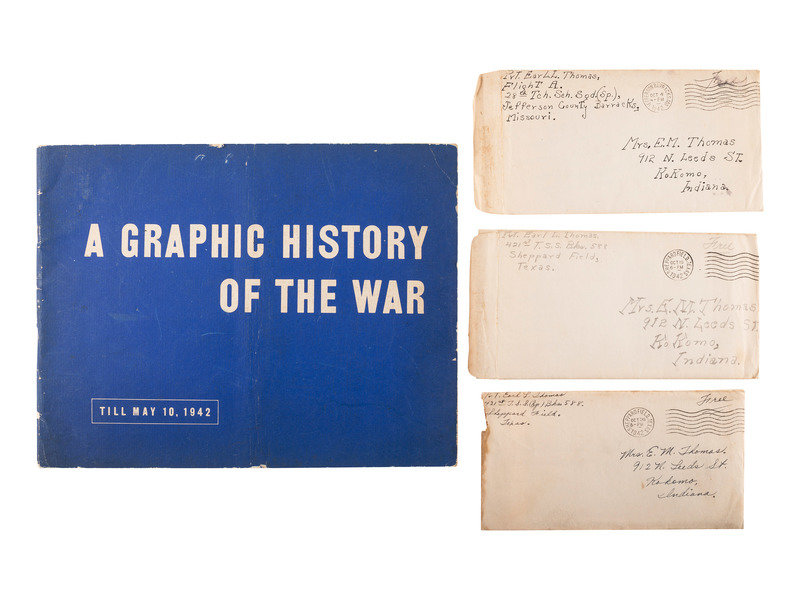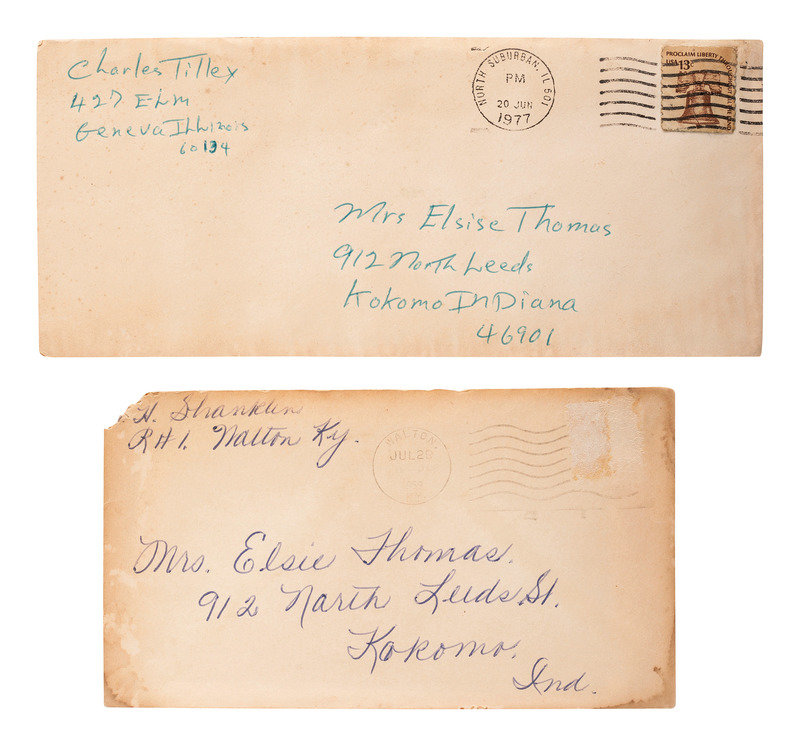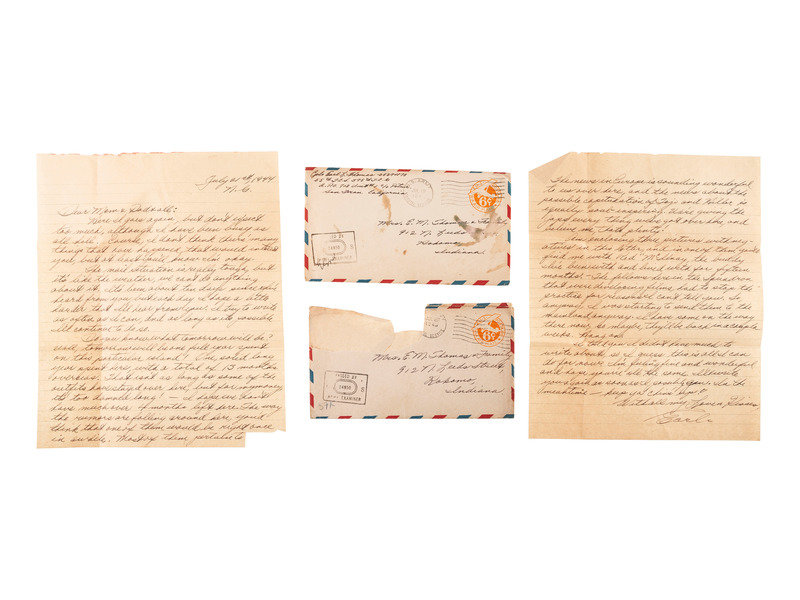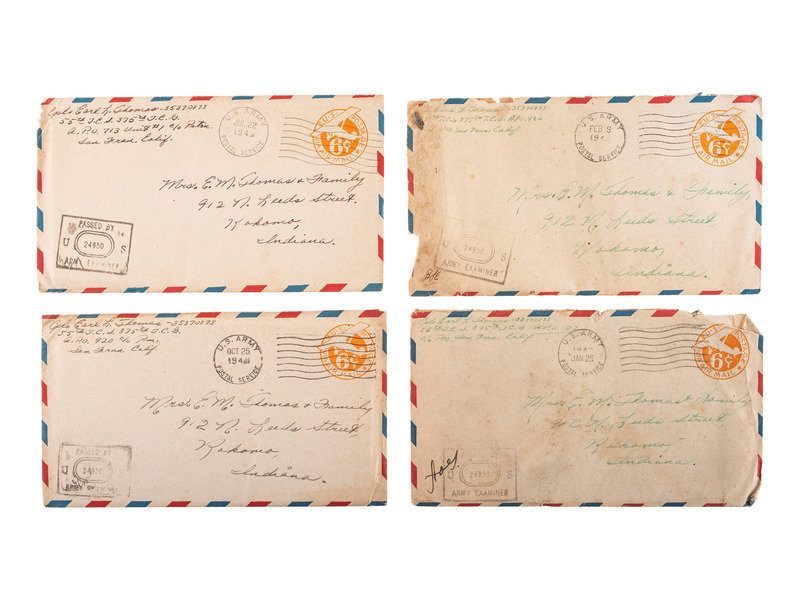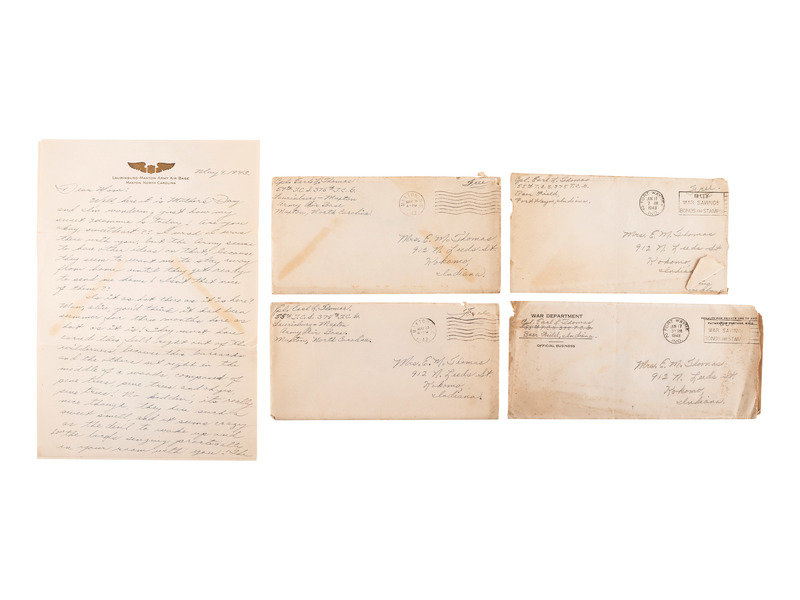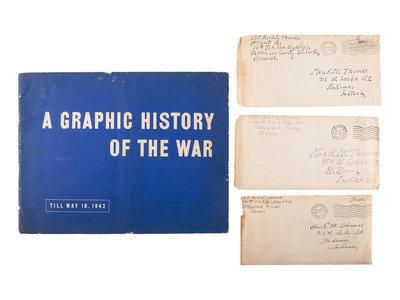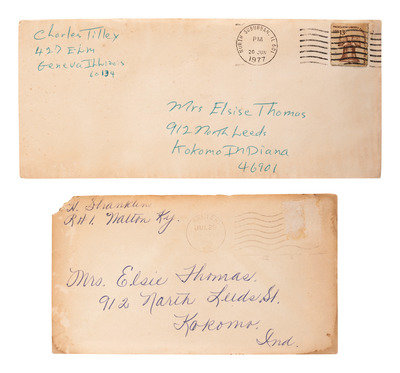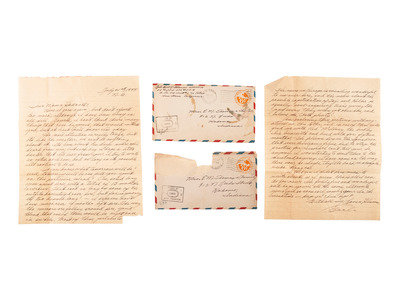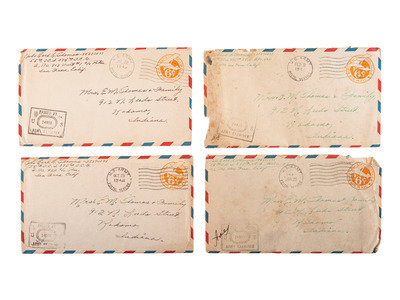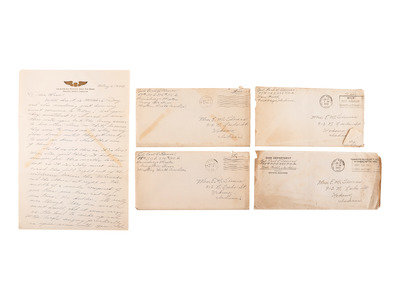Condition Report
Contact Information
Auction Specialist
Lot 697
[WORLD WAR II]. Manuscript archive of Private Earl L. Thomas, US Army Air Corps, 1942-1945.
Sale 1047 - American Historical Ephemera & Photography
Lots Open
Jun 17, 2022
Lots Close
Jun 28, 2022
Timed Online / Cincinnati
Own a similar item?
Estimate
$300 -
400
Price Realized
$188
Sold prices are inclusive of Buyer’s Premium
Lot Description
[WORLD WAR II]. Manuscript archive of Private Earl L. Thomas, US Army Air Corps, 1942-1945.
Archive of approx. 65 items, predominantly letters accompanied by several telegrams, also with approximately 9 photographs, a sleeve ensign, and miscellaneous ephemera.
One of the anonymous thousands of Americans who enlisted in the summer 1942, Earl Leonard Thomas (1921-1984)) of Kokomo, Indiana, followed a deeply felt sense of duty and loyalty to his country into the Army Air Corps. Light-hearted, often joyful, Thomas was an average, but thoroughly avid soldier, utterly convinced in the righteousness of his cause and committed to doing his best. A mechanic on a ground crew for the Air Corps, he served in a Troop Carrier Squadron in the South Pacific, writing long letters home to parents and siblings that described, within the limits of wartime censorship, his activities and feelings about the war and military service.
The collection begins shortly after Thomas's enlistment in October 1942 when he was sent for training to Jefferson Barracks in Missouri. His first impressions of the Civil War-era barracks provide a taste of his writing and sense of humor, something he managed to sustain throughout his service: "Walter Winchell, radio commentator, once said that there are only two concentration camps in the United States, and that Jefferson Barracks were both of them, and I'm certainly not beginning to believe it.... The chow is the only thing anybody likes and that is extraordinarily good. Naturally, the only thing we can do it take it and grin."
After a short stay in Missouri, Thomas was sent for training to Sheppard Field, Texas, then to Santa Monica, Cal., and Maxton, N.C., all the while champing at the bit to get overseas: "By the looks of the papers, things are really going to pop pretty soon, and the Japs and Germans had better watch out! I hope they wipe every last one of 'em out! Right down to the last man, eh, Mom?"
Thomas's letters contain enjoyable accounts of his training, wartime secrecy in travel, his glee on winning top scores one day in training when making a utility wrench by hand, and the mundane and the extraordinary during this extraordinary period. As light hearted as he was, Thomas was not a light weight: he was as prone to missing his family as he was certain that what he was doing, as banal as it was, was critical to the war effort. One of the best letters in the collection, written while he was stationed in New Guinea on June 16, 1944, is a paean to his beloved C-47 air transports, the workhouse that supplied American forces throughout Asia: "I got to thinking the other night (two nights ago) just how much our ships do and how little credit they get for it, and so suddenly decided to spend about forty-five minutes and put my thoughts down on paper. This is the result of it.... I'd love it if I thought I could get it published in the paper, because maybe it would convey to some people that bombers and fighters aren't doing all the work. Where would this war be if it weren't for badly needed supplies? Where would the Japs be if it hadn't been for these planes in the New Guinea zone?..." The essay that follows, "The purpose of Pegasus," is a heartfelt appreciation of the C-47. "She's a horse alright. A work horse. She's known in the world of the Army and Air Force but it isn't a humble and lowly title.... Just look at her there in the evening sunlight, parked in her own private revetment! The purple and golden shades of color in the western skies are in direct contrast with the drab war paint coating her metallic skin. It's a dark color, this olive crab, and the lengthening shadows make it seem even darker, but the waning sun reflects from the plexiglass windows and dome, and little pinpoints of fire dance cheerily and brightly...."
Interestingly, after moving to the Netherlands East Antilles in January 1945 Thomas wrote that their "beloved" C47s were being replaced by the Curtiss Commando, C46. "I don't know what to think of them, they must be a good ship or the Army wouldn't have accepted them, but no one seems to like them. I say to be a little fair and broadminded to them, and give them at least a three month trial, and then we'll see how they are going to hold up..."
Thomas's letters from the South Pacific are richer than typical World War II soldier's letters, and are often enlivened by his irrepressible sense of humor. In July 1944, for instance, he wrote from New Guinea: "Today looks as though it will be a typical New Guinea day, hot and tepid, and the hours filled with planes and noise until 6:00 this evening. Yesterday was July 4th, Independence day, but we don't have much independence over here. Thinking back, I guess I was pretty independent while I was home, though. I did what I pleased, and came and went when I pleased. That may be allright sometime, but I guess that one can't be trusted too much when he's like that...." In other letters, he provides a moving account of being away from home for Christmas, discussions of the day to day and the future, and more.
One letter from Sheppard Field encloses 9 photos of Thomas and friends, and in another, he includes his sleeve ensign. He also includes small sketches, including a schematic drawing of a barracks and a handsome plan of the airbase at Maxton, N.C.
A solid World War II correspondence grouping from a member of the Air Corps in the South Pacific. Thomas's collection makes up for the limits of wartime censorship with fine writing, a sense of humor, and a joyful attitude.
Good condition with minor staining; most letters with envelopes.
[With:] A Graphic History of the War: September 1, 1939 to May 10, 1942. Prepared for use with the War Department Orientation Course, ca 1942-1945. 72pp, 11 x 8 1/2 in. (light wear, chipping and abrasions to cover) -- The Game of Salvo As Played by Our Armed Forces. W.H. Harper, 1943.
